
This review may contain spoilers
Dare To Take Risks!
This is a series that finally looks through the looking glass from the other side. Instead of having one or more characters coming from wealthy, prominent families, we have four people in their late 20s struggling to make ends meet, just like most of us. What makes this series work so well is that you can relate to the characters.If you want to get anywhere in life, risks are necessary. Vulnerability is necessary. Those who play it safe never truly get anywhere, and this series is about fulfilling your dreams and taking that big first step outside your comfort zone that just might lead to something great. Complacency and settling are the only true enemies to success. If you have a dream, you have to go for it and let nobody stand in your way. Teddy Roosevelt once said, “far better is it to dare mighty things, to win glorious triumphs, even though checked by failure than to rank with those poor spirits who neither enjoy much nor suffer much, because they live in a grey twilight that knows not victory nor defeat.” This series emulates this truth.
Ko Dong Man is a disgraced MMA fighter, who finds himself doing odd-jobs just to make ends meet. Of course, he hates his jobs, but perhaps not as much as he hates his abusive boss. Still, he knows that he’s not doing what he loves: being an MMA fighter. And he finally decides to go back to it. His best friend is childhood friend, Choi Ae Ra whose loves for Ko Dong Man is only matched by her overbearing, temperamental demeanor. She often acts more like a mother than a friend. Choi Ae Ra is a woman who is also stuck in a rut, working a thankless job at a department store. Her dream is to become an announcer.
Kim Joo Man and Baek Seol Hee are in a six-year relationship and are basically living together as well as working at the same company. However, they aren’t married yet as Joo Man believes that he needs to be able to provide a better life for Seol Hee, even though it’s apparent that Seol Hee doesn’t care about that. Joo Man and Seol Hee share a sweet relationship that has, perhaps, gone a little stale. This leads Joo Man to make some unwise decisions when a female co-worker shows interest in him. Unable to see the situation for what it actually is, he falls into the traps laid out for him by the co-worker.
All four characters find themselves navigating the pitfalls of jobs and romance as they struggle to eke something out of the dreams that each of them has for themselves. Is it possible? Isn’t it safer to just continue to work in a meaningless occupation where neither passion nor fulfillment exist? You might be surprised how many people actually believe that it’s better to play it safe. I’ve even heard parents tell their children this.
There is only one Adrian Balboa. I’m talking about Rocky Balboa’s wife who hated the fact that Rocky was a boxer and routinely got hurt. However, after going through her own fears, she understands that she hasn’t the right to stand in the way of her husband’s passion and dreams. Nobody has that right.
Choi Ae Ra is a woman who loves Ko Dong Man, but she hates the fact that he is an MMA fighter. It’s understandable. How can someone stand by and watch someone they care about continuously get hurt? She can barely watch the fights that he’s in, and most of the time, she is paralyzed with fear that she’s left in tears. It’s not for everyone. However, Choi Ae Ra makes the mistake of giving Ko Dong Man an ultimatum: give up fighting or lose her. This is an unfair and completely selfish demand. If a person can’t handle being around someone else due to their job (military, policeman, etc.) then that person has every right to step out of that world, but don’t ask that person to give up being who they are. I was thrilled when Ko Dong Man refused to give in to her ultimatum and stuck with his dream. After all, he’d already quit on his dream once. Understandably, he can’t do it again.
The cast is first-rate, with Park Seo Joon (Ko Dong Man) and Song Ha Yoon (Seol Hee) being the standouts for me. This is the fourth time I’ve seen Park Seo Joon, and he brings his boyish charm and great sense of humor to his roles. This one is no exception as he virtually steals every scene he’s in. We laugh and cry with him. Song Ha Yoon is the same for me. As much as I like Kim Ji Won, Song Ha Yoon has a veritable sweetness and childlike vulnerability that is captivating. When she is crushed due to Joo Man’s betrayal, she makes us feel it. She is also the more mature of the two female leads.
The series is quite light without any serious drama or any ridiculous love-triangles. We do have Park Hye Ran who keeps trying to get her ex-boyfriend, Ko Dong Man back, but after already been burned once by her, he shows absolutely no interest in her at all. I was relieved. I nearly cringed and said, “Oh, no! Not another love-triangle!” As much as I like K-dramas, they do tend to milk the “love triangle” a bit too much.
I was also pleased with the more mature approach to the relationships. After six years together, it makes perfect sense the Joo Man and Seol Hee are living together. And while we have just a few awkward moments between Ko Dong Man and Choi Ae Ra, it also made sense that they would have a desire to spend the night together. “We’ve known each other for 20 years! How much slower do we have to go?” they ask. It added charm and realism to their situation, which always felt natural rather than awkward. I also tend to cringe in dramas where any act of intimacy (even just hugging or kissing) is treated like a crime is about to be committed. I will say that the scene where Ko Dong Man and Choi Ae Ra accidentally fall asleep in the hotel room together was absolutely hilarious!
I absolutely love how expressive Korean actors and actresses are, especially when you get really good ones like these four performers. You feel everything they feel, and there is no shame in the expression. We see just how crushed Joo Man is when he breaks down in tears after realizing that his naivety has disastrous consequences, or Choi Ae Ra’s reaction to Ko Dong Man getting seriously hurt in his fights. I love how these actors are able to tap into those emotional wells as it makes it all so real and poignant.
If you’re looking for something light and fun as well as something that you’ll likely relate to, you really can’t go wrong with this fun and delightful series!
Was this review helpful to you?

This review may contain spoilers
An Epic Series About Political and Business Corruption In Korean Baseball!!!
When I first got into K-dramas about four years ago, my first series was “Descendants of the Sun.” For me, it was like finding a gem after some lackluster TV series in the West. But, I thought that I was only lucky once. Then another series came along, and then another. To this day, I’m still amazed at how finding one “gem” has led to an entire treasure trove!Hot Stove League is a brilliant series about the interworking of a Korean Professional Baseball team, the Dreams. In the first episode, we find out that this team is terrible in nearly every facet of the game, aside from having one of the top hitters in the league. We also find out that, despite the terrible years of being “cellar-dwellers” the team continues to have a genuine following with its fans. In other words, no bandwagon fans here!
It doesn’t take long for us to realize that there is corruption at the top and throughout the team, whose owners are hellbent on gutting the team from within with the hopes of either selling or disbanding the team. Teams in Korea are owned by corporations. There have been many instances of this type of corruption within American sports teams as well. Donald Sterling (previous owner of the Los Angeles Clippers) routinely traded away any good, viable players. Publicly, he stated, “I only care about making money.”
Enter Baek Seung Soo (beautifully played by Namkoong Min) as the team’s newest GM. He has no experience in baseball at all, but he’s put together championship wrestling teams, hockey teams, and handball teams which won Olympic medals. Clearly, one of the representing owners of the team, Kwon Kyung Min (played by one of the best Korean actors in Oh Jung Se) is hoping that Baek Seung Soo will be a puppet GM who has new clue about what to do. He’s quickly proven wrong, and to everyone’s wonder, Baek Seung Soo quickly begins to right the sinking ship!
Baek Seung Soo has to deal with corruption within his own people, a corrupt scouting manager, and a slugger in Im Dong Gyu, who believes himself to be untouchable and can treat everyone around him with violent disdain.
Baek Seung Soo’s first task is to gain the support of his staff, many of whom are already scratching their heads regarding his hiring. The most charming and hard-working of the group is Lee Se Young (played by the ineffable Eun Bin Park!) and her tenacious assistant, Han Jae Hee.
Baek Seung Soo is a man who cares very little about what people think about him, and yet, he shows off his brilliance like a grandmaster chess player. He also always seems to know exactly what is going on within the staff, the organization, and the players. He’s calm but incredibly efficient, despite his lack of personal tact. He doesn’t engage in pleasantries or anything at all that may seem superficial. In short, he’s confident enough in himself to simply be himself. From other people’s point of view, he comes across as rude and insufferable, which quite frankly, adds to his charm and appeal. We rarely ever see him lose control of his emotions. He reminded me a lot of Mr. Spock from Star Trek; a man displaying wisdom well beyond his years. He may be new to the sport of baseball, but when it comes to playing the political and business game, he’s more than a match of his adversaries.
As with so many K-dramas, the show presents a heartfelt message on the back of an engaging and provocative show. It’s about people who need to learn how to speak up and stand up for themselves, and not worry so much about the consequences of their actions. There is real strength in numbers, and in a culture that is highly competitive, and where “underlings” are expected to bow and obey every order without comment or complaint, the series demonstrates that this is not the way to behave or conduct business. It demonstrates that money isn’t everything and that those who have it are quite often the most miserable people around.
This series has a top-notch cast which cannot be showered with enough accolades! Oh Jung Se (whom I first saw in “It’s Okay to Not Be Okay”), plays the complex, villainous role of Kwon Kyung Min like a master of his craft. We get subtle hints, that despite his pettiness, there is something else going on, and of course, Eun Bin Park is a young woman who can easily do any role that is handed to her, even capturing the funniest line of the series! Namkoong Min, whom I’ve only seen once so far in “Awaken” is nothing short of sublime.
The series reminded me a little of “Misaeng” in which we are given a glimpse into the Korean corporate baseball world and perhaps see that, despite the culture, there isn’t that much difference between East and West when it comes to depraved depths that people will go for money. Indeed, in today’s world, money is threatening to bury all that we love and hold dear about professional sports and why fans love them.
Was this review helpful to you?

This review may contain spoilers
The Despicable and Deplorable People of Angok!
If you're looking for something along the lines of "Hometown Cha Cha Cha," you will be sadly disappointed. And if you're looking for a mystery/thriller along the lines of "Stranger" or "Flower of Evil" you will also be disappointed. "Summer Strike" is not a romantic series, despite the presumptions one might get as the series begins, and the story is far darker than one might anticipate. In many ways, the writers seem unsure of the story. In many ways, the writers seem unsure of the story they want to tell. The romantic scenes have little-to-no chemistry between the leads, and we're left with a town of despicable, moody, and angry people who aren't very appealing.Yeo Reum Lee is a 28-year-old woman who acts like she's 18 at best. She's basically a doormat for anyone to use and abuse. She never speaks or stands up for herself and frequently makes poor choices based on the smallest influences from those around her. She's a pleaser who lacks the ability to stand on her own two feet. She's neither a mature nor a strong woman. She flees Seoul for the small seaside town of Angok, hoping to simply live an easy and frugal life. The big question is: is Yeo Reum running toward something or running away? The more we observe Yeo Reum, we can see that she doesn't change. She leaves one abusive life for another because she refuses to see that SHE is the problem. When you move from one place to another, you take your problems with you. They don't get left behind.
Kim Seol Hyun is the weakest of all the actors in this series. She just can't seem to get a handle on her character while frequently uttering her lines in a soft, breathless manner. When she's being chased by the police officer, she doesn't shout at the taxi driver to keep going, she softly says in a mousy voice, "Please don't stop. Please keep going!" Nobody in that situation would react that way! Especially a woman! Kim Seol Hyun can't even manage to put panic into her voice. She was a poor choice for the female lead of this series.
You can pretty much go down the line of characters that will leave you cringing. Arguably the worst is Ji Young Jo, who works at the library, has feelings for her co-worker and childhood friend, Da Beom An, and treats him like an overbearing mother hen. There is scarcely anything appealing about this woman who snaps and barks at everyone around her. She also does her absolute best to control and manipulate Da Beom into living the life that SHE thinks is best, without taking any consideration for his feelings. I'm not sure I've seen many characters in 45+ years of television who are as deplorable as well as lacking in any positive qualities. I'm not sure how anyone would ever find this woman as being attractive or appealing. She's as horrid as a snake with fangs at both ends!
Don't get me wrong, I liked Granny for her sweetness, even though she's a very weak-willed woman who has zero control over her son or anyone else. She's told-even by her grandkids--what to do. She is a perfect example of how Yeo Reum will likely be when she gets to be the same age. I'm not sure what kind of a grandmother would summarily dismiss an attack on her granddaughter and ask her to lie to the police in order to avoid sending the father (her son) to jail. What kind of a family member--who has ANY love or integrity--would make such a decision? It was heinous and sadistic. You would support a man who is physically abusive as well as being a raging alcoholic who nearly kills his own daughter?!
A big issue with Yeo Reum Lee and Granny is their inability to speak up--especially when they NEED to speak up! If you're not a part of the solution, then you are a part of the problem. And it's people like these two who help keep the cycle of abuse going because they are too afraid to do the right thing--and do right by others--and speak up. Make no mistake, by not saying anything, they are just as responsible for the abuse as those who are doing the abusing, which is another reason why I disliked these characters so much. And people who are too afraid to properly discipline their children, are child abusers themselves.
It seems that Chang Soo's wife can only ever vent her anger on everyone around her, including the physical abuse of a little dog. This woman is hateful, and where we are supposed to be sympathetic, all we see is a vile woman who cannot see beyond her own tragedies and problems.
This is actually true for most of the series; moments when--if we felt any kind of REAL emotional connection-we should feel sympathetic toward many of these characters. Kim Bom and Da Beom are the only two characters in the series for whom I felt some sympathy.
For the most part, this series is very dry, uneven, and disjointed, and it doesn't venture deep enough for us to really gain some perspective on characters like Da Beom and Kim Bom. Frankly, the series would have been better served had these two been the focal points of the story. Yeo Reum is hardly appealing, and by the end of the series, I couldn't have cared less about her situation. She was mostly annoying, and by the end of the series, it's clear that she hasn't learned a thing or shown any kind of growth. She's very much like a woman who's never grown up.
Despite all of these problems, the show works for the most part. I'm glad it didn't go beyond 12 episodes because the series was starting to limp toward the finish line at the end. We get the wrapping up of a mystery that already had a very weak foundation and hints of possible romance between the two leads that had no warmth or chemistry to it. Even when Da Beom is hurt or in pain, Yeo Reum just stands there, offering little-no comfort.
Angok is a dark and dismal town compared to the one from "Hometown Cha Cha Cha" filled with angry, immature people who gripe and complain about everything. There's nothing so sad as one person playing the victim as a whole town doing the same. And that isn't inspiring storytelling at all. It's sad, and not in a good way.
Was this review helpful to you?
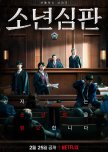
This review may contain spoilers
Who Will Save The Children?
There is a universal disease that runs rampant throughout the world. It really doesn’t matter the country or culture. It’s there. And it’s something that has become indelibly worse over the years. The disease is indifference. And we see first-hand in this series how much indifference has seeped into the children of society. Children are no better than adults when it comes to preying upon those they deem weak and worthless. Physical and cyberbullying are only the symptoms of a much bigger problem. They are symptoms of indifference.The series could almost be called, “The Tragedy of Judge Shim.” She is a cold but effective judge who confesses that she despises young offenders. The reason for this hatred stems from a past experience that we don’t learn about until the series' last two episodes. It is not accurate to state that she doesn’t care. She does. And she is just as eager to investigate a case and uncover the truth as she pronounces sentences that she feels are the most effective and the most just when dealing with juvenile offenders. Unfortunately, Judge Shim lives in a prison of her own making. She lives in a barren apartment that has no warmth or meaning to it. Her sole purpose is to preside over juvenile offenders. In many ways, she’s allowed those who killed her son to kill her as well. For what kind of a life is that? In the end, the perpetrators may have finally been brought to justice, but she’s allowed them to destroy her too.
Judge Shim is an effective judge even though she can be quite foolish. Chasing a young offender through the streets to try and apprehend her alone wasn’t a smart thing to do. Also, breaking into the hideout of a known, violent offender was beyond foolish. It nearly got her killed in the process. But I suppose that someone who’s essentially already dead inside, probably doesn’t care too much about what happens to them. Indifference isn’t only about how we treat others. It's also about how we treat ourselves.
If the numbers that are put on display at the very beginning of the series are accurate—3,300 judges in Korea with only 20 juvenile judges—we can see why the youth of Korea are in such dire straits and why the juvenile courts certainly need more help and resources.
Each case spans about two episodes, and neither the writer nor the director holds back when it comes to depicting youth crimes. They are raw, violent, and meant to demonstrate the sheer cruelty that is perpetrated upon those who are preyed upon. It shouldn’t matter that these are children and not adults. We quickly find that it doesn’t matter the age or the circumstances. Children are just as capable of any type of violent crime as their adult counterparts.
One of the reasons I love K-dramas so much is that most of them carry a much-needed message. A show like this isn’t just for entertainment purposes but is trying to shed some light on a much-needed issue that must be addressed. Many victims and victims’ parents ask the same question: “How can someone so young do something like this?” We live in a world we think is safe. We live in a world that should be safe, especially for the children. But, sadly, it is not so.
If you don’t address the core problem, then nothing will change. Things will not only stay the same, but they are likely to get even worse. There is a common denominator among many young perpetrators. They come from broken homes. They tend to come from poor families. They tend to be bullied children and outcasts themselves. Some have mental disorders. And ironically, these are also the commonalities found among adult criminals as well.
Punishment is pointless without rehabilitation. Judge Kang is correct in his assessment that harsher punishments don’t work. Rehabilitation is required. And as Judge Shim points out to Judge Cha, it does, indeed, take a village to raise a child. People are like points on a spider web. Remove one point, and the entire web begins to come apart. And it takes teachers, friends, family, shopkeepers…everyone! Raising a child is NOT about telling them what to do and what not to do. It’s about empowering and educating them so that they can make wise decisions. But none of that matters unless indifference is removed from the equation. Compassion is a key component, for if people truly care for each other, they will always look out for one another.
One of the saddest things I saw in this series is the ostracizing of the victims. My God! This is proof of the indifference that I’ve talked about. How can you simply cut off a person for something that happened to them? And blame them? That is truly sickening, and those who do these things are no better than the criminals themselves. Indeed, they are the same.
Performances across the board were astounding and powerful. Kim Hye Soo gives us Judge Shim who is strong on the outside but broken on the inside. I saw Lee Sung Min in Misaeng—a series in which he was nothing short of brilliant—and I was thrilled to see him in this series as a judge who’s lost his way.
This isn’t necessarily an easy series to watch, but it’s a necessary one. If people don’t start to wake up and realize that changes are needed in how we deal with each other, let alone our children, then it really will be impossible to save the children, let alone anyone else.
Was this review helpful to you?
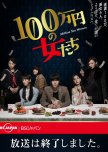
This review may contain spoilers
Incredibly Powerful and Compelling Work of Art!
This is the type of film that could easily be talked about and discussed in universities. If it isn't, then it's a tragedy. This complex, amazing character study rivals some of the best films and shows that I've ever seen in over 40 years of viewing.This film is truly a work of art. Each character brings something refreshing, new and compelling to the table (almost literally!).
This powerful character study is about a novelist with a tragic past who is unable to become a successful author. For some strange reason, five women are invited to live with him for a million yen per month. When he's not writing, he cooks and looks after them. Each woman is different in age, occupation, personality, and background. Part of the mystery is in trying to figure out why the invitations were sent, what the purpose of the women being there is, and who sent them.
The author learns to accept his new living situation, and finds that there are rules for his interactions with them.
The story weaves like a fine tapestry of tragic, complex pasts in the lives of all of the characters, and basically what drives people to do things and be who they are. It's riveting story-telling that keeps you hooked, and makes you wince when the number of episodes left to watch dwindles. You want more. You crave more, and you find yourself grateful for finding such a unique and exquisite gem such as this series.
This is a series that can easily be watched over and over again. It's touching and heart-breaking that compels the viewer to dig deep within themselves; about the walls we put up to keep from being hurt; about the fear of loss, and the fear to love.
I can't recommend this series strongly enough. It's a story with characters that stays with you long after you've finished, and that's the mark of something so powerfully artistic in how it captivates its viewer.
Was this review helpful to you?

Predictable, Silly, But Cute Series!
If you're looking for something fun and light, you really can't go wrong with "A Love So Beautiful." Frankly, there have been better shows involving a girl who falls in love with a boy where the girl (for some reason) isn't very bright compared to the object of her affection. "Good Morning Call" and "Mischievous Kiss: Love in Tokyo" are better series.This is a story that has been done a number of times, although the twist toward the end finally gives it some brand of uniqueness despite knowing how it's going to end. Not all shows that are predictable are necessarily bad.
Shin Sol-Yi is a young, passionate girl, who's quite naive and also very immature for her age. Unfortunately, this doesn't really change as she gets older. She starts out as a 17-year-old girl, acting like she's 10. She ends as a twenty-something woman acting like a 12-year-old. She whines and pouts, and too often this becomes a little annoying.
I've lived and worked in China, Korea, and Taiwan. And I've told people: take the girl's age and subtract ten years to get her true maturity. It rarely fails.
Cha-Heon is the object of Sol-Yi's affection. He's the top student, but he's a bit cold and aloof when it comes to Sol-Yil and her more than obvious interest in him.
The performances are pretty good. Yo-Han Kim (Cha-Heon) is a bit wooden in his role. So Ju-Yeon (Shin Sol-Yi) has the cutest dimples in the world and a million-dollar smile to boot. I only wished that she'd been able to bring more depth and dimension to her character as well as giving her character a bit more maturityj to make her more appealing and less annoying.
The kissing scenes in this show are some of the worst I've ever seen. Wooden, tight-lipped with absolutely no feeling or authenticity at all. It was quite obvious that the actors and actresses did NOT like doing them.
Still, this is a fun series to watch. It's nothing too special, but it's a solid feel-good story that will likely put a smile on your face.
Was this review helpful to you?

The Science of Love and Marriage
How many plays, books, songs, TV shows, and films have been made about love over the centuries? Too many to count, I'd wager. Some have given us exceptional and even beautiful depictions. Others have been incredibly superficial. Love is like the wind. You know it's there, but you can't really grasp it. There is a reason for this. Love is never about holding on. It's always about letting go. And true love is completely unconditional.I personally believe Shakespeare described love the best when Juliet states, "My bounty is as boundless as the sea. The more I give to thee, the more I have, for both are infinite."
It is highly likely that, as a viewer, you will be able to relate with one or more of the characters of this drama. Most everyone has been in similar positions: getting together out of convenience, loving someone whose ambitions are greater and perhaps even different than your own, or loving someone who doesn't share the same feelings that you do. We also have characters who are too afraid to love for fear of being hurt.
This K-Drama works well because it doesn't get bogged down in needless melodrama, and it presents six characters that--on some level--nearly everyone can relate to. It is also fairly light without any big emotional twists that, too often, are typical of these kinds of shows. Instead, the writing is crisp because it stays true to the natural course of events rather than forcing them.
Along the way, the narrator, often Ji-ho and sometimes Se-hee ponder what love and marriage are, what their purpose is, and how to best make it work. Is it enough to marry only for love? Is it foolish to marry without any compatibility or shared interests? Sometimes, they resort to quotes from famous authors, and other times, they speculate on their own.
Too many people, due to the pressures of parents, society, and religion (sometimes all three!) believe that marriage is the only way to be happy. Marriage is not for everyone, and too often, couples treat it as the Finish Line rather than the Starting Gate. Yes, marriage is the beginning, not the end. And, yes, it IS work!
People also marry for the wrong reasons: to prevent having to be alone, to feel a sense of completion and well-being by being with someone. Happiness in marriage can never be found in your partner. It can only be found if you already have that happiness, and you are ready to share that with someone else. You cannot give what you do not have, and too often, we unfairly and unrealistically make our partner responsible for our happiness. Any relationship that takes on this idea is already doomed to fail.
These are topics, themes, and even questions that are addressed throughout the run of this series. Perhaps that is why it is a series that can be enjoyed by young and old alike, as well as people in/out of relationships as they address questions regarding love and marriage...topics that have been talked about since the beginning of time.
There are many cute, funny, and even ponderous moments. And in my book, that makes this a true treasure of a series to watch and enjoy...perhaps even with your partner!
Was this review helpful to you?
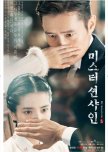
One of the Best Shows I Have Ever Seen!
I have been watching movies and shows for over forty years. And, yes, this show is THAT good! After watching "Descendants of the Sun" only a couple of years ago, I was wondering how long it would be before another grand series came about; a series that resonates with the heart and soul; a series with a crisp story and fantastic performances by the actors. And along came "Mr. Sunshine."I can only think of a couple of series that are on par with "Mr. Sunshine." "Band of Brothers" is one and "Descendants of the Sun" is another.
What is truly sad is that much of the world is quite ignorant when it comes to Korean history, I'm sure. It's a country that always seems to be at odds with Japan, and sometimes China and Russia as well. Its turbulent history has too often been plagued by invasions or other countries attempting to gain control of the small peninsula.
"Mr. Sunshine" tells of the time when Korea was, once again, fighting against Japanese occupation in the beginning of the 20th century. With virtually no real army to speak of and a king with little power on the throne, Korea or "Joseon" found itself relying on rebel guerilla tactics to try and prevent the Japanese from a complete takeover.
Several characters find themselves unknowingly intertwined with each other at the outset of the series. One boy finds himself quickly orphaned and making his way to America to begin a new life. He returns to Joseon years later as a U.S. Marine Captain. Little does he know how the turn of events would pull him into the conflict between his previous homeland and Japan.
The story's focal point is on three men who all happen to have feelings for the same woman, Go Ae-shin; a woman with a background as terrible and wrought with horror as the marine captain's. And yet, she is the heart and soul of the rebel forces. It is admirable and captivating to see this woman spearhead the rebellion, as well as her willingness to do whatever it takes to help her country. Tae-Ri Kim is perfectly cast, giving Ae-shin tremendous depth and complexity to her character.
The cast is simply magnificent from top to bottom. Every role, no matter how large or small, is handled with immaculate precision and depth. However, there is, to my mind, one who stands out just a hair above the rest. And that is Byung-Hun Lee as Eugene Choi, the marine captain. The man has a regal distinction that very few actors in history have been able to pull off with such ease. He may appear to be emotionless in many of his scenes, but to make such an assumption would be wholly inaccurate. I've said many times: an actor/actress who can say more with their eyes than with words, is a true master at their craft. Byung-Hun Lee is such a performer. I cannot imagine anyone else playing this part with the integrity and depth that he brings to Eugene Choi.
This is quite literally a "Do not miss!" series. With 24 episodes, each at about 75 minutes each, you are in for a wonderful treat. This is a show to savor. One might be wishing to quickly move on to the next episode, but I found myself stepping back and letting each episode soak within me instead. Like a perfect French dessert, you relish taking your time and savoring each bite. This is such a series.
Was this review helpful to you?

This review may contain spoilers
All Storms Eventually Pass
There is a blessing in hitting “rock bottom.” There is only one direction to go: up. There is also a blessing in knowing that whatever problems or troubles you are having, they will pass.Life is all about perspective. How you perceive something determines how you choose to experience it. If you don’t like the experience you’re having, then change your perspective. There is no one in existence who hasn’t endured hardships. Even masters have gone through everything you are going through and have gone through. So, what’s the difference? They simply changed their perception as well as used wisdom to ask the right questions. Life isn’t about having all of the answers but about asking the right questions. Why am I going through this? What is it that I’m trying to teach myself in this moment? The late and great Kobe Bryant never referred to his hardships as “problems.” He called them “challenges.” See how changing one word can change how you perceive something?
“Doctor Slump” is about two competitive doctors who suddenly find their lives turned upside down by circumstances. Remember the immortal words of Rocky Balboa, “Life isn’t about how hard you can hit. It’s about how hard you can get hit and keep moving forward.” And these two loveable characters get knocked down to their knees, but ultimately, they find a way to get back on their feet. This is also why, as a viewer, I found myself cheering for them both.
Dr. Yeo Jeong Woo is a brilliant plastic surgeon with a heart of gold. It’s hard to imagine this guy hurting anyone. He finds himself set up during a botched surgery that destroys his reputation and finds himself in dire, financial straits as well as facing criminal charges. And yet, he does his best to take care of his friends. Dr. Yeo Jeong Woo has a boyish charm and a wonderful sense of humor, thanks to actor Park Hyung Sik whom I’ve seen in several series. He has a gift for charm and comedy as well as being able to effortlessly harness the pain and despair he goes through.
Dr. Nam Ha Neul is an up-and-coming anesthesiologist who finds the dissertation she’s worked on being stolen and altered for a greedy, corrupt supervisor. Her own reputation is destroyed when she confronts him, even knocking him to the ground, which was far better than he deserved. Dr. Nam Ha Neul may perceive herself as weak, but she’s far stronger than she gives herself credit. Her pain and despair comes from guilt; guilt of not being there for her father as well as allowing a previous supervisor to take advantage of her. Park Shin Hye is equally captivating in her role. She has a sweetness that is undeniable and a light and glimmer in her eyes and smile. And yet, when either of these actors has moments of despair, we feel it.
The premise of this series is that no one should be afraid to seek help when needed. An even more important premise is that you are your top priority. You must take care of yourself first. It’s a losing battle to try and take care of others without, first, taking care of yourself. Putting others first is a road lined with resentment, guilt, and anger. And perhaps the third premise is learning how to be there for someone and letting them be there for you. Most people fail to realize that quite often, the best way to help someone is to just simply be there for them. It may not seem like a lot, but ultimately, it’s one of the greatest gifts you can give them. The beauty of a rock is that it’s just there. It doesn’t have to move or do anything. And everyone can be a rock for someone in their lives.
What makes this series so enjoyable is that there aren’t any needless melodramatic twists or turns. No silly love triangles or mountainous conflicts that we know are just there to add some conflict. The series is light despite the fact that it never makes light of the trials and tribulations of others or the pain that they are going through.
The greatest obstacle to pain is suppression. It’s been stated that the quickest way out of something is through it. To avoid it or try to find a way around it is to simply bring about needless suffering. Pain in life is inevitable. Suffering, however, is always optional.
Park Hyung Sik and Park Shin Hye have undeniable chemistry in this series which is why it works so well. I think they may be my favorite couple after “Our Beloved Summer.” I love the goofiness that Park Hyung Sik brings and the sweetness of Park Shin Hye as well as the fact that, while both characters are going through pain, they’re both fighters and are determined to come out on top. They are inspirational as well as captivating.
The only aspect of the series that didn’t quite work for me was the second romance between Bin Dae Young and Lee Hong Ran. It just didn’t feel needed, and it was as though the writers were trying to fill some empty space with a romance that just didn’t feel organic enough. Not to mention that the only romance that I cared about was between Yeo Jeong Woo and Nam Ha Neul.
So, the next time you get “knocked down” let this series serve as a reminder that every storm always passes. Don’t be afraid to experience pain. It’s still the quickest way out. Never give up. Keep fighting and keep moving forward. Don’t forget to make yourself the number one priority, and lastly, once you get yourself firmly anchored, be a rock for someone and just be there for them and let them be there for you.
Was this review helpful to you?
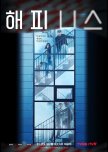
This review may contain spoilers
Plays Like a Bad American Horror Movie!
If this series had been a comedy, I probably would have laughed more and also in more of the right places. Unfortunately, it’s not a comedy. It plays like a bad American horror movie where the sheer level of stupidity that dominates the characters is the primary source for the laughter; the absolutely clueless and absurdity is not to be underestimated. If you've ever seen an American horror movie, you know how often characters make really dumb decisions, and when they're killed off, you just shake your head because their own stupidity did them in.A disease has broken out the causes the infected to attack and bite the victim in order to satiate their unquenching thirst. However, once bitten, the victim becomes infected. It’s like a cross between a vampire and a zombie. However, unlike Train to Busan, this series as virtually no suspense whatsoever.
Yoon Sae Bom is a member of an elite anti-terrorist unit. She’s sassy, capable, and has dreams and aspirations of moving into a nice new apartment complex; a complex that requires the applicant to have enough “points” to qualify (recommendations, marriage, etc.). She marries her childhood friend, Jung Yi Hyun, a detective who had aspirations of becoming a professional baseball player. They marry for the convenience of being co-owners of the apartment. However, we already know that Jung Yi Hyun has loved Yoon Sae Bom since they were in high school together. Yeah, we already know where this is going.
Yoon Sae Bom quickly finds out just how shady the residents are in the apartment complex. There is really nobody good. And this is what she dreamed of, eh? We have a doctor who’s killed his wife. A seemingly affluent woman who wants to be the resident business leader of the complex. Power and money become the sole driving force of nearly every resident. This doesn’t even change when the complex comes under quarantine due to the disease. Soon, residents are fighting over food, water, or any means of trying to get ahead. Oh, and we also have a serial killer among the residents, as if everything else wasn’t quite enough. How so many “bad eggs” can all be in one place at the same time is like rolling “snake eyes” in Vegas twelve times in a row.
The lockdown aspect was intriguing until we find out that the infected only reach a “ravenous state” for about fifteen minutes. Meanwhile, a military colonel is trying to find a cure without letting the higher-ups know about it, as he’s afraid that they will use their perpetual greed to control the cure, and the colonel’s wife is one of the infected.
Yoon Sae Bom and Jung Yi Hyun try their best (well, not really!) to control the crazies and the situation. Ironically enough, for two people in law enforcement, they consistently make horrible decisions.
First, we have Dr. Oh Joo Hyeong who’s being arrested for the murder of his wife just as the lockdown takes place. However, instead of taking him into custody and at least locking him in a room, he’s given free reign to move around. Of course, knowing that he’s likely facing a prison sentence, he does everything in his power to subvert and plot against Yoon Sae Bom and Jung Yi Hyun. And each time they stop him, he’s STILL given a license to move about freely. Talk about stupid! This was one of the comedic elements that wasn’t really funny. I was simply laughing at how inept and pathetic our two main characters were.
Next, we have “Andrew” the serial killer. It’s funny that neither of our two leads suspect him for anything, given that he never shows his face which is constantly hidden behind a mask, and that the face on the ID card is scraped up so that you can see the photo. Now, it’s understandable that this story takes place on the cusp of COVID. It’s already been scientifically proven that masks do not have very much of an effect in preventing you from catching a disease. It’s more of a suggestion which is why so many people still believe that they do. However, given that Andrew goes to great lengths to hide his face, especially when eating or drinking, you would think that this might be a “red flag” to our two veteran members of law enforcement (three if you count Jung Yi Hyun’s cowardly, inept partner, Kim Jeong Gook who can only whine, cry, and complain at every turn).
We also have Oh Yeon Ok, the woman attempting to become the elected representative who is more worried about losing her position than anything else. She frequently goes into frantic rages when it becomes clear that she’s willing to do anything (even commit murder) to be elected. Bae Hae Seon plays her a bit over-the-top, and our two resident cops allow her to walk all over them rather than take charge of the situation. Instead, they try to be political rather than act like officers, which makes everything even worse.
The first six or seven episodes are quite good when the viewer is trying to figure out everything that is going on, but when the infected all but disappear, and the focus shifts to the residents and their power plays, the whole script falls apart, and we no longer really care what happens to most of them.
The last episode attempts to drag things out with an absolutely pathetic ending; all done for effect, of course. Jung Yi Hyun has been shot and taken captive by Andrew after Jung Yi Hyun somehow fails to disarm him (who knew a kid without any fighting skills could out-fight a cop who’s shown his hand-to-hand prowess up until now?). Jung Yi Hyun is on the ground being held up by Andrew but only covering his lower half. Yoon Sae Bom has a clear shot at Andrew. Instead, she shoots herself in the arm in order to get the infected Andrew to transform. Talk about making a really dumb choice! He staggers toward her, allowing Jung Yi Hyun (who has reclaimed the gun) to shoot Andrew in the head. Never mind that he’s already weak and also ignoring the fact the Yoon Sae Bom still has her own gun but shoots anyway, even though she’s in the direct line of fire. Talk about being lucky!
Yoon Sae Bom and Jung Yi Hyun are about as believable as cops as Donald Trump is of being president. Yes, that’s how bad these two were. It's sad that this is a wasted effort because both characters are likable and I like that Yoon Sae Bom is a strong woman who is no wallflower by any stretch of the imagination.
I was glad that this series only went 12 episodes. It should have been cut down to half that. The writer should be drummed out of the business for breaking one of the most basic and cardinal rules: never change a character for the sake of moving the plot. In other words, never make a character do something they would never do just to make the plot work. Yoon Sae Bom and Jung Yi Hyun make so many bad decisions, it’s a wonder they live to tell the tale. Well, when you have a writer who can make it happen, then that’s the blessing of it!
What’s sad is that most of the performances were pretty good, despite having some of the most depraved and sick people occupying one apartment complex (and no, I’m obviously not talking about the infected). These people should have been quarantined long before any disease entered the picture. Frankly, this series should be quarantined to the basement shelves too.
Was this review helpful to you?
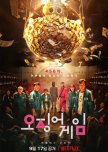
This review may contain spoilers
Money Can't Buy Happiness!
An old man presents an interesting premise. He asks, “What does a person with no money have in common with a person who has too much money?” His response is, “Neither one can have any fun. Having too much money soon becomes boring.” Such is the delusion of money. It cannot buy fun, love, happiness, or anything else that isn’t materialistic. It can only buy things. And things have a highly delusive quality to them. Why? Because people suffer when they don’t get what they want. And even when they get exactly what they want, they still suffer. Because they can’t hold onto it forever.The same old man reminisces about his childhood days of being able to play with his friends seemingly forever without any rules or constraints. People are very much like children in their attachments to things. A child gets a new toy until he plays with it enough, and then he’s bored with it. Adults are no different. The World of Delusion promises only fleeting moments of happiness that always has the same result for everyone: the feeling of emptiness.
Squid Game is about human greed and how deep and low a person will stoop for a chance at 45 Billion Won (just over 33 million dollars). The target participants in these games are people who are in dire an desperate financial straits. People who owe such a debt that it’s all but impossible for them to get out from under. How they got into these situations isn’t really the issue compared to the fact that they’ve found themselves stuck in a hole they can’t get out of—until they receive a card; an opportunity to not only pay off their debts, but to possibly have enough money to secure their futures. However, nobody explains to them that nearly all lottery winners or people who win exorbitant amounts of money almost always end up broke. Such is the pitfall of “never having enough.” Even Ebeneezer Scrooge once stated, “There is no such thing as rich enough, only poor enough.”
Seong Gi Hun is a man in severe debt. He’s borrowed incredible amounts of money. He’s a divorced man living with his mother and trying to be there for his estranged daughter. He goes so far as to steal money from his mother in order to bet on horse races, with the hope of winning enough to treat his daughter to a birthday dinner. The people he owes money find him and threaten with severe bodily harm if he doesn’t come up with the money soon. He receives the invitation; an opportunity to play a game for money. More money than he could dream of!
Of course, nothing is as it seems as Seong Gi Hun and 455 other participants are whisked away to a strange island to play six games. Winner takes all. What Gi Hun doesn’t realize is that the games played to the death. He watches in horror as 200 people are killed playing, “Red Light, Green Light.” And as with all aspects of human greed, shaky alliances are formed for protection as well employing means of disposing of the competition. Sleepless nights are common as participants fear attacks in the middle of the night, and we wonder just how strong the initial bonds of friendship and comradery will last when lives and the money are on the line.
We find out that this entire game is an instrument of the incredibly rich from various countries and walks of life. Why? For entertainment. For the ability to revel in some “fun.” Never mind that that “fun” comes at the high price of human lives. Nobody cares. Not the people sponsoring the games nor the participants, no matter how much they may cry “foul” they still play. Ironically, after the first game, the participants vote to end the games, but after more time of suffering financial woes, they reluctantly agree to play again. Like people who frequent casinos, they will lose, but they will always come back. Strangely enough, even if they win, they will also always come back. That’s why they say, “The House always wins.”
I watched “Alice in Borderland” right before this series. While both series are incredibly well done and thought-provoking, I found “Alice in Borderland” far more insightful and sublime in its premise that it’s an allegory for life; that the joys and horrors of this world are not real. “Squid Game” is more specific in exposing the level of human greed and how base human “morality” becomes when money is the goal. As the Bible verse states, “For what does it profit a man should he inherit the world but lose his soul?”
It's not hard to guess that Seong Gi Hun wins the games, but interestingly enough, he refuses to use any of the money he’s won. Survivor’s guilt? Blood money? A final conversation with one of he masterminds behind the games causes him to think about his life, as he’s lived a full year without spending any of the money. Finally, after coming across another “participant” it’s clear that the writers have set up a “Season 2” with Seong Gi Hun vowing to expose the people behind the games.
This isn’t your typical “K-Drama.” It’s vicious and brutal without apologizing for it. There are characters you cheer for and others you immediately despise. There are also some you may find yourself cheering for, but in the end, you are hopeful for their downfall. And there are still others you initially despised but find yourself rooting for. Isn’t that very much like how people are treated in the real world? How ironic that most people love to pull a hero up, but not nearly as much as they love tearing one down.
The series was nearly perfect, except for one big flaw. The police officer who is able to sneak onto the island and uncover what is going on. Somehow, the police officer is able to follow a van in the middle of the night along a dark road to an exchange point. I’m not exactly sure how the driver of the van didn’t notice a single car trailing him the entire time. That was really far-fetched. I also didn’t see how the police officer was able to prevent his cellphone from running out of battery power (as he spends much time recording and taking photos). He certainly didn’t have a charger with him! The whole scenario with the officer should have been handled differently. Instead, like too many of the participants, he just had an incredible run of luck!
Performances across the board were fantastic with Lee Jung Jae leading the way. He was fantastic in “Chief of Staff” so I was already excited to see him helming this series. Even the pink hair got a laugh from me!
Squid Game endeavors to say a lot about people and the imbalance that exists in this world between the 1% and everyone else, and how that chasm is getting wider all of the time. It’s been stated that there is only one, true joy that you can have when you have “too much” money. And that, of course, is to share it. To use it to help others who are in need. The irony of money is that it can never buy happiness nor can you take it with you.
Was this review helpful to you?
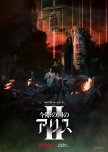
This review may contain spoilers
The Beauty of Shadow and Light
******************** I'm reviewing Seasons 1 & 2 here ************************This series is a masterful allegory about life based on Lewis Carroll’s “Alice in Wonderland” which is, itself, an allegory as well. However, this series take things to a whole different level.
Paramahansa Yogananda referred to life as like a Cosmic Motion Picture, in which we are the writers, actors, and even the directors in our own cosmic movie. Shakespeare equated life to a stage play saying, “All the world’s a stage and all the men and women merely players; they have their exits and their entrances and one man in his time plays many parts.”
In today’s world, one might easily equate life to a video game. You play and play until you’ve mastered the game in order to “clear it.” As you can see, the world of “delusion” is created with opposites. Light and dark, joy and sorrow, love and hate. Why? Because in order to experience light, there must be darkness. If all there was is light, then it would be impossible to experience it.
Virtually every master has said the same thing, but perhaps in different words; don’t take life so seriously. Learn to enjoy it. Don’t get so caught up in the “bad” things that you forget that none of this is real.
Arisu (Alice) is a young man who finds himself transported into another world, or another reality. Everyone has suddenly vanished except for himself and his two best friends. Tokyo appears empty of nearly all of its inhabitants. He quickly learns that he must play and clear games in order to survive. Failure to participate in a game within a certain time means automatic death. Clearing a game grants the victor a visa, in which the participant is given three days of a reprieve before another game must be played.
All games are based upon the classic playing cards with each suit and number designating the type of game (teamwork, deathmatch, betrayal, etc.) and its difficulty level (2, 3, 4, etc.).
The games alone are fascinating as we see participants stripped away of their morals and idealism in order to simply survive. We see people quickly betraying others. We see people so distraught by the pain and anguish that they simply give up, preferring death to any more “suffering.” And, of course, we see those rare few, that despite being knocked down and tempted with giving up, strive to continue in order to find out what this whole thing is all about. Arisu is such a person.
Arisu soon meets Usagi (Rabbit). At first, they form an uneasy alliance, and soon a friendship develops. Arisu is the idealist. He’s the person, despite making mistakes, refuses to give up. He’s a young man who had absolutely no direction in his life. He spent his days playing video games and hanging out with his two best friends. His father and brother are clearly disappointed in him for lounging around the apartment all day and doing nothing. However, Arisu is not without asking questions to the big picture. What is life? Why are we here? And as the game begins taking the lives of his friends and comrades, he even asks deeper questions such as, “Why am I alive?” Anyone who has suffered tremendous pain or suffering has asked this question.
Usagi represents the escape; the person who can only remember the pain of the “real world” and has no desire to return to it. What’s the point of “waking up” if all there is is more suffering? To Arisu’s surprise, she confesses that she prefers the “game” world, despite the horrors of mass murdering, betrayal, and constant threat of death at every turn. If you think this is pessimistic and having a quitter’s mindset, ask yourself why there are so many people in the world who prefer pain and suffering to the unknown? To the possibility that there just might be a way out? In short, Usagi is the person who prefers her comfort zone; her security and has no reason to stray beyond it.
Arisu and Usagi seem to find a community (church or religion) called “The Beach” in which people seem to be enjoying themselves in relative safety. However, not everything is as it seems. You must “follow the rules” or be designated a “traitor” and possibly killed. It’s lead by people who set up these arbitrary rules on how to live. Many of its inhabitants seek only refuge or pleasure. Others believe they can find a way to beat the game. The Beach represents the dangers of allowing anyone else to tell you how to live your life. It represents the dangers of giving power to the blind; to those who have no idea how “get out.” And because all religions are self-serving, the Beach is soon destroyed from within.
Season 2 sees Arisu and Usagi attempting to clear the most difficult games: the face cards. Some of the games employ the use of logic, trust, or simply mere survival (in the case of the King of Spades). Ironically, the last challenge to overcome is from the Queen of Hearts herself. She represents false love/hope that asks you to simply give in to a game which mirrors Lucifer’s own ideal; that it’s better to be a king in hell than a servant in heaven. However, before her demise, the Queen of Hearts smiles and gives Arisu a heartfelt reminder: life is choice. There is no “right” or “wrong” choice as there are always consequences no matter what you choose.
The final episode is a pure work of metaphysical art. It attempts to give an explanation where no explanation will suffice. It demonstrates that an attempt to understand the world through intellect alone will always lead to oblivion. We get so caught up in the world that we forget that it’s just an illusion; a creation of our own making. And perhaps that is why the most powerful message, and reminder, is the last shot of the season as a table with playing cards are swept away—all except for one which sits proudly in the middle of the table endeavoring for us to laugh at the joy and absurdity of it all: the Joker.
To the master, the universe is a playground. Much like this series depicts, it’s like entering a cosmic amusement park. To the unawakened, the dangers and pleasures seem real and they go round and round until they’ve had enough; to where they feel compelled to try and “wake up.” To the awakened, it’s simply to be enjoyed, both “good” and “evil” because in truth, neither one exists. They are mere fabrications on the cosmic motion picture of shadow and light.
Performances across the board are first-rate. We find ourselves getting attached to one or more characters, wondering who will “survive” and who will “die.” We see humanity’s beauty on full display, from acts of love and bravery to acts of insanity, brutality, and cowardice. The series makes no apologies for its depictions, nor should it. Stripped away, with nowhere to hide, we see people at their highest and their lowest.
This isn’t an easy series to watch either, as the violence is very extreme, so if you’re a bit skittish, you may want to avoid this series; unless you can understand that this is nothing more than a game. It isn’t real. Paramahansa Yogananda took some nuns to see a violent western. The nun sitting next to him covered her face with her hands because the violence was too much for her. He gently pulled her arms down and said, “Watch. Don’t get so caught up in it. None of it’s real.”
This is a series that could easily be the topic of discussion in any university class from psychology or philosophy to religious studies or any class having to do with human behavior. Yes, it is that profound, and by the time the series ends, you just might find yourself laughing along with the Joker, realizing that you were caught up in something and then realizing that none of it was real. So, enjoy!
Was this review helpful to you?
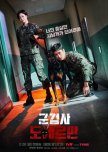
This review may contain spoilers
Doberman Bites and Doesn't Let Go!
Military Prosecutor Doberman is a fun ride that navigates through both corporate and military corruption. This isn’t something new, as we’ve seen plenty of stories with this combination, but this series certainly brings a new sense of style, combining drama, comedy, and thriller genres.Captain Doh Bae Man (can’t believe it took me a whole episode to get his name connection!) is a military prosecutor who was orphaned at a young age when his parents (both military prosecutors) were killed in a car accident (of course, it wasn’t an accident). So many people in K-dramas are killed involving a vehicle, that it’s tantamount to the number of Americans in American series killed by gunshots!
Doh Bae Man is initially a self-serving prosecutor who uses the power of his position to put money into his pockets. As far as he’s concerned, nothing else matters. Suffering from memory loss, he doesn’t recall the details of the accident that took his parents’ lives. On the side, he works for Yong Moon Goo, then head of a prestigious law firm who promises a high position in any law firm that Doh Bae Man wishes as soon as he’s discharged. In exchange for handling (or in Doh Bae Man’s case) mishandling cases, he’s given boxes full of cash from Yong Moon Goo.
Little does Doh Bae Man realize that there is something sinister going on around him at the military base he’s assigned with General Noh Hwa Young being in the center of it all. He also doesn’t realize that there is a connection between the general and the death’s of his parents. It isn’t until Captain Cha Woo In is assigned to his office that she nudges him to start connecting the dots.
Cha Woo In also has a dark past with General Noh Hwa Young, as the general also ordered the death of her father in order to take over his company, IM Defense Industries, which was a major player in signing contractual deals with the military. However, General Noh Hwa Young isn’t just about gaining money, but power. As part of a secret society of high-ranking military officials who all wish to nudge Korea into a future that they want, Noh Hwa Young wants to be the top-dog. She has a spoiled cowardly son in Noh Tae Nam whom she wants to complete his military service.
We see corruption at its lowest as General Noh Hwa Young skillfully manipulates and removes anyone or any obstacle that gets in her way. She’s frightening enough to make any military official quake in their boots, and Oh Yeon Soo, does a fantastic job with the role, ensuring that Noh Hwa Young is a very cool, calculating person who should never be underestimated. Too often, we’ve seen men assume these types of roles, so it’s incredibly refreshing to see a woman take on the role of chief villainess.
As Cha Woo In helps Doh Bae Man peel back the layers of corruption as well as his own lost memories, Doh Bae Man begins to change. He realizes that he’s also been used by Yong Moon Go, and that it is finally time for him to utilize his office for which it was intended: to carry out justice.
Doh Bae Man is an extremely intelligent prosecutor who is a master of manipulation and seeing things that nobody else is able to see. He’s a bit reckless sometimes, but too often, we see how he’s the mastermind behind so many amazing plans. Ahn Bo Hyun is fantastic as the confident, often arrogant Doh Bae Man who flashes his boyish charm to manipulate witnesses or convicts into doing what he needs them to do.
Cha Woo In is more level-headed and less emotional than her counterpart. Aside from being an absolute master of hand-to-hand combat, she’s smart enough to allow Doh Bae Man to regain his memories on his own rather than simply tell him. She knows that it’s far more effective for him to do it this way. However, Cha Woo In doesn’t have Doh Bae Man’s gift for seeing the “bigger picture” and doing what is necessary to carry out their plan. At first, this makes her a bit of a “weak link” in the courtroom, until she begins to understand what’s going on. She tends to be a bit too naïve and trusting where being cautious and calculating is far more prudent. In short, these two make a fantastic one-two punch team as they begin to learn from each other and how to use each other’s tactics.
Kim Young Min is probably my favorite actor of this series as the very cool and highly intelligent Yong Moon Goo. I tend to prefer villains who show their prowess with intelligence rather than with brawn or ridiculous, over-the-top outbursts. While he isn’t immune to revealing his frustrations, we see just how formidable he is, and as a viewer, we wonder who will win out: Yong Moon Goo or Noh Hwa Young? The high-powered lawyer or the high-ranking general?
The series only has a few minor problems. First, is Cha Woo In going around a red wig as a vigilante. This was almost as laughable as Clark Kent hiding his Superman disguise with a pair of glasses. So many people who know Cha Woo In, fail to recognize her simply due to a red wig. Had she kept her sunglasses on, it would have worked. This ended up going way too far.
Next, we have too many actors—who are supposed to be military generals—not acting like military generals at all. They have no esteem or presence as a military general would. Only Noh Hwa Young is the exception. The worst is easily General Heo Gang In, who acts more like a bumbling, inept fool. He’s so bad that he’s not even believable as a military person at all. Jung In Ki’s interpretation was an especially poor one and completely unbelievable.
Finally, the level of bullying that seems to emanate at all levels of the Korean military makes anyone wonder how in the world the Korean military can function at all. We hardly ever even see soldiers on duty. They’re all playing sports, loafing around in their barracks, and having free reign to come and go as they please. Given that corruption was from the very bottom all the way to the very top was just too much. I understand that the writers probably wanted to do their best to expose this type of corruption, but for this story, it was a bit too much. It was overkill.
Still, don’t let these minor issues fool you. This is a solid series with something for everyone. The plot twists themselves will likely have you guessing what’s really going on. I was also tremendously relieved that the series didn’t get sidetracked with a silly romantic storyline that would have pulled everything off course. They saved the one kiss for the end. We knew there was something between Doh Bae Man and Cha Woo In. There was no need to go any further than that, especially when their focus (their goal) was on the case. Just like a Doberman, this series is likely to bite you and not let go until the very end!
Was this review helpful to you?
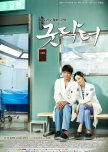
This review may contain spoilers
Accepting People For Who They Are!
I’ve now seen three series with autistic characters being the subject. “It’s Okay to Not Be Okay” was the first with Oh Jung Se giving an absolutely riveting performance! The second was “Extraordinary Attorney Woo” with the incomparable Eu Bin Park. And ironically, despite this series coming out before all of them, I finally watched this one with Joo Won also giving a tremendous performance. However, that being said, “Good Doctor” is easily my least favorite of the three.Dr. Park Shi-On is an autistic young man who aspires to become a pediatric surgeon. Growing up with a sadistically brutal father who beat him relentlessly due to his disability, he’s eventually raised by the loving Dr. Choi who is the director of Sungwon Hospital. Dr. Choi hopes to help Dr. Park fulfill his dream; a dream he made after watching his older brother die in an accident in a mine.
Dr. Park has many obstacles to overcome, not the least of which are prejudice and discrimination, not only among his own colleagues but among parents too. Because of his persistence, he doesn’t give up and finds solace it the little souls of the pediatric ward who really don’t see him as anything other than a person. A slightly strange person, perhaps, but as a person nonetheless. Such is having the eyes of a child and seeing the world that way. Guilt, shame, and prejudice are all learned behaviors.
The first seven or eight episodes are tough to wade through as we see Dr. Park taking constant verbal abuse, especially from his mentor and superior, Dr. Kim Do Han and his chief assistant, Dr. Cha Yoon Su. Dr. Kim goes so far as to punch Dr. Park after a surgery. What is ironic is that Dr. Kim had a younger brother with autism, and yet he openly abuses Dr. Park without apology. If you truly think that abusive teaching methods are the best way to teach anyone, then you have no idea just how primitive and ignorant your beliefs are. Dr. Cha—in some ways—is even worse. She rebukes him with, “Stop acting like a kid!” She also physically hits him a number of times, but her even bigger “crime” is treating Dr. Park like he’s broken.
Dr. Kim justifies his treatment of Dr. Park with a strange question to Dr. Cha: “Would you rather have a great doctor who makes poor decisions or an average doctor who makes great decisions?” His point is that he wants Dr. Park to be the latter. However, his ignorance clouds his judgment as he clearly overlooks the third option to that question: Why not a great doctor who makes great decisions? That is what he should inspire Dr. Park to be. There is absolutely no justification for abuse. None. As an ESL teacher who has spent most of his career in Asian countries, I know that this isn’t something that has been completely expunged. Many teachers and even parents still firmly believe that abuse is necessary. They may not call it “abuse” but abuse it is.
Dr. Kim slowly begins to take to Dr. Park. However, during one particularly disturbing scene, Dr. Park is being beaten up by two bullies. Dr. Kim sees what is happening. He gets out of his car and walks to help Dr. Park. Walks. Not run. That was more disturbing than watching Dr. Park getting assaulted which showed just how little Dr. Kim thinks of Dr. Park.
Toward the last five episodes or so, it becomes clear that Dr. Cha is starting to develop feelings for Dr. Park, despite Dr. Park being rejected early on when he shares how he feels with her. However, Dr. Cha makes one big mistake when she goes out a blind date and finds that Dr. Park isn’t upset about it. Anyone who truly thinks that jealousy equals love doesn’t know love at all. Jealousy has absolutely nothing to do with love. Jealousy is about ego, power, fear, and control—things that love can never be. In many ways, Dr. Park proves himself to be far wiser and more mature than Dr. Cha, who frankly, has a lot of growing up to do.
The medical episodes regarding the pediatric patients were the most intriguing part of the series to me. I loved how Dr. Park could empathize and relate to them, using his own child-like purity. The surgeries were fairly well done, despite some serious flaws (such as doctors contaminating each other by touching each other in the OR which happened several times!)
However, the relationships weren’t quite as compelling to me. Dr. Park’s father is just a drunken, abusive tyrant, and it was disturbing to see how Dr. Park’s mother wilts around him, proving herself to be a very weak woman. The actor playing Dr. Park’s father was a bit too over-the-top for my taste. Barking and spewing nonsense in virtually every scene quickly became tiresome.
Quite frankly, the relationship between Dr. Cha and Dr. Park that develops toward the end of the series just didn’t feel organic or real enough. Moon Chae Won is a very good actress, but she almost seemed lost in how to make Dr. Cha actually develop romantic and loving feelings toward Dr. Park. She never says, “I like you” or even “I love you.” She only ever talks about how uncomfortable she is with Dr. Park possibly dating someone else (again, a sign of jealousy and possession; not love at all). “Extraordinary Attorney Woo” the romantic angle worked because the ML accepted and loved her for who she was; he never wanted her to change. We don’t get that same feeling from Dr. Cha who is constantly trying to get Dr. Park to change who he is. And anyone should know that whenever you enter a relationship with the hope of changing the other person, the relationship is ultimately doomed to fail. Relationships are always about the possibility of changing yourself, not the other person.
Initially, Dr. Cha obviously has a crush on Dr. Kim. It’s both sad and disturbing that she would find Dr. Kim even remotely appealing after his blatant abusive behavior toward Dr. Park. It certainly doesn’t speak well about her taste in men at all, Dr. Park notwithstanding.
We have a political power struggle doing on at the hospital which works somewhat well. In many ways, however, it just didn’t add much to the story, which should have kept its focus on Dr. Park.
In Jae was one of my favorite characters of the series; a young teenager who’s desperately in need of an intestinal transplant and her sister who is doing everything she can to raise enough money to pay for it. I loved In Jae’s interactions with Dr. Park. She clearly has a crush on him, and it’s sweet how she tries to help him navigate the minefield of “first love” when she finds out that the object of his affections is Dr. Cha.
Performances are largely very well done, with the notable exception of Jung Ho Geun (Dr. Park’s father). Standouts to me are Joo Won (Dr. Park), Kim Hyun Soo (In Jae), and Kwak Do Won (Mr. Kang), who plays the deputy director of the hospital with a calm, calculating demeanor which I found refreshing.
This medical drama also has the worst defibrillation scenes I've ever seen! The victims don't react or jump because the doctor removes the paddles during defibrillation! Sad that they couldn't even do those scenes right.
All in all, the series is good, but overall, it fell short for me, especially in some of its depictions of autistic people (which I found far more appealing in the other two series mentioned). I understand that they wanted to show how hard it would be for Dr. Park, but I found some of the scenes to be overkill and even more troubling how people continued to treat him as a broken man who needs to be fixed. If the moral of the series had been to treat people as they are and to accept their differences no matter what, then perhaps this series may have been far more inspiring than it truly was.
Was this review helpful to you?
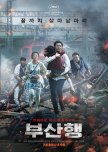
Exceptional Horror Flick That Runs Deep!
I’ll be honest. I’m not a fan of zombie movies. George Romero’s “Night of the Living Dead” is still a classic, but even that movie didn’t exactly thrill me. To me, zombies tend to be boring. The slow, gaited walk—despite the overwhelming numbers—just made them less imposing than they should be.“Train to Busan” not only gives us an absolute thrill ride, but it also does what Korean filmmaking has been so good at over the years; it gives us food for thought and for people to decide what’s really important. Who else could put such a message, and do it effectively, than the Koreans? In short, this is the first zombie movie that I’ve seen that has heart and depth.
I will say that this is the best zombie movie I’ve ever seen. The zombies don’t do the stupid walk in this film. They run. They chase in a relentless frenzy that begs the viewer to ask, “how in the world did they film that?!”
Seok Woo (wonderfully played by Gong Yoo) is a workaholic father who has little time for his daughter, who begs him to take her to Busan to see her mother. Seok Woo is a man so disconnected from his daughter, Soo Ahn, that he doesn’t realize that he’s bought her a birthday gift that she already has. He finally agrees to take her.
In the meantime, a massive outbreak of “infected” people begin to take over, and of course, it only takes one as an infected woman jumps aboard the train just as it’s leaving the station. What transpires after this is an absolutely incredible survivor movie and what becomes of human nature when lives are on the line. There are those who believe in doing right by people, and there are others who believe that survival by any means necessary is justified. Interestingly enough, Seok Woo starts off as a man who believes that saving himself and his daughter is all that matters, leaving one man to rebuke him harshly for his selfish behavior.
Once the pursuit is underway, you have a good idea of who is most likely to survive, but there are still questions regarding the other characters and whether or not they will make it. And on a deeper level, what will these people do in their last moments, which brings us some very compelling moments.
On the one hand, this is a survivor movie worthy of “Titanic” or “The Poseidon Adventure” or “The Towering Inferno.” And on the other hand, it also begs the viewer to ask questions that could easily be used in a university philosophy class.
Performances are stellar across the board, but Kim Soo An really impressed me as Seok Woo’s daughter. The last few minutes of the film are heartbreaking and heart wrenching.
There isn't much music in the film, which adds to the effect, but when it kicks in, you know that you-know-what is about to hit the fan!
There really isn’t an element of this film that I can say came up short. From story to characters, to cinematography, this movie excels in every category. I see why this film is already considered a classic, and it’s the only zombie movie that I plan to add to my collection!
Was this review helpful to you?

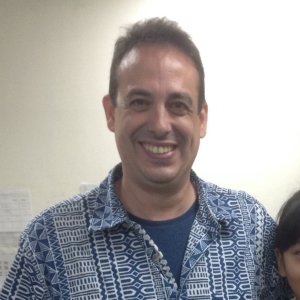
 1
1













